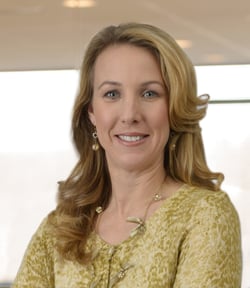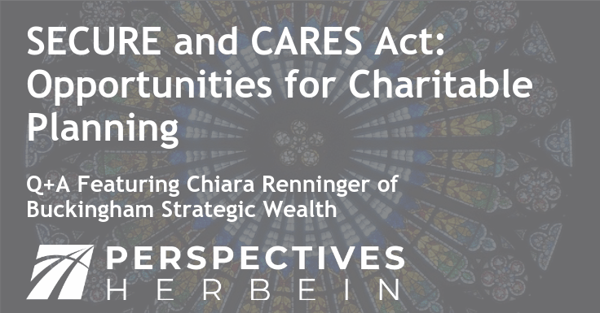SECURE and CARES Act: Opportunities for Charitable Planning
SECURE and CARES Act: Opportunities for Charitable Planning
A Herbein PERSPECTIVES blog contributed by Chiara Renninger of Buckingham Strategic Wealth
Even as COVID-19 continues to impact people and economies around the globe, the market environment arising from this crisis offers significant advanced planning opportunities. The combination of historically low interest rates, depressed valuations and the passing of two major pieces of legislation have created some unique charitable and estate planning opportunities.
.png?width=350&name=BSW_Logo_Color%20(1).png) On December 20, 2019, the first substantial retirement-related legislation since 2006 was signed into law. The Setting Every Community Up for Retirement Enhancement Act, also known as the SECURE Act, changed several rules regarding retirement accounts for individuals and business owners. This was followed closely by the Coronavirus Aid, Relief, and Economic Security (CARES) Act, passed in late March 2020, providing additional tax savings opportunities.
On December 20, 2019, the first substantial retirement-related legislation since 2006 was signed into law. The Setting Every Community Up for Retirement Enhancement Act, also known as the SECURE Act, changed several rules regarding retirement accounts for individuals and business owners. This was followed closely by the Coronavirus Aid, Relief, and Economic Security (CARES) Act, passed in late March 2020, providing additional tax savings opportunities.
With all the law changes, market volatility and uncertainty, many business owners, wealthy families and individuals should consider taking a closer look at their finances before year end. I am presenting these planning opportunities in a Q&A format giving you a glimpse of how advisors at Buckingham Strategic Wealth help our clients navigate these complex situations.
Question #1: How did the SECURE and CARES Acts change IRA required minimum distributions (RMD)?
If I turned 70½ in 2020, am I still required to distribute money from my IRA this year?
Answer: No. The SECURE Act allows individuals who turned 70½ in 2020 or beyond to postpone their initial required distributions until they reach age 72. If you turned 70½ in any year before 2020 (pre-SECURE Act) you are still required to continue to take an annual required minimum distribution. However, with the passing of the CARES Act in March, everything changed and all 2020 required minimum distributions are suspended for any type of IRA, 401(k), 403(b) or 457(b) plans (even for Inherited IRAs).
Question #2: Can I still give money to charity direct from my IRA, if I am over age 70 1/2?
Answer: Even though the SECURE Act changed the required beginning date for RMDs to age 72, individuals who are over 70 ½ are still allowed to make qualified charitable distributions directly to a charity from their IRA. The advantage of giving money direct from an IRA is the distribution is not included as income on your tax return. Since the CARES Act suspends the required distribution, you may choose to hold off and make the qualified charitable distributions in January 2021 when the required distributions return. This will allow you to reduce the amount of taxable 2021 RMD. If you are younger than 70 ½, you do not qualify for charitable IRA distributions.
Question #3: Should I make qualified charitable distributions from my IRA or give cash outright?
Answer: The CARES Act included a provision allowing individuals to deduct cash gifts to qualified charities up to 100% of their Adjusted Gross Income (AGI). This is an increase from prior years when the deduction of cash gifts was limited to 60% of AGI. This provides a unique opportunity for individuals between the ages of 59 ½ - 70 ½ years old, who are charitably inclined and have large IRA balances. During 2020, an individual who is age 62 could take an IRA distribution of $100,000, then use that cash to donate to his or her favorite charity. If their AGI was $160,000, they can deduct the $100,000 gift and may be left with as little as $60,000 of taxable income. If you are subject to the highest income brackets, it may make sense to gift enough cash to lower your taxable income to the top of a lower tax bracket. You also have the option to carry forward any unused 2020 charitable deduction for up to five years. This could be very valuable to those who do not have large amounts of taxable income.
This is a unique opportunity only available in 2020. With the right distribution and charitable planning, nonprofits can benefit from much needed help and support while individuals utilize the available tax incentives.
Questions 4: Should I combine a Roth Conversion with my charitable planning?
Answer: Yes! Consider processing a Roth Conversion this year, allowing the converted funds to grow tax free with no required minimum distributions. Since tax will be owed on the conversion amount, give the same amount of cash to charity for a tax neutral transaction. With equity markets down this year, it is an ideal time to review Roth conversion. The extra incentive due to the CARES Act allowing 100% deduction for cash gifts makes it an even more timely strategy.

Question 5: Can I use appreciated securities instead of cash to make a charitable contribution?
Answer: Yes, there are several ways to give appreciated securities. First, you can give direct to charities for a current year deduction. A second option would be setting up a Donor Advised Fund (DAF) at an approved institution. The benefit of a DAF is that you receive a current year charitable deduction (assuming you itemize your deductions) for the security value transferred. The actual donations to charity do not have to occur before year end. You can bunch or double up your donations to the DAF every other year, so you can use the standard deduction one year, then itemize the next. This strategy, just like all of the strategies, takes coordination between your advisor and your CPA.
Question 6: I want to leave money for a charity at my death. What is the best way to accomplish that?
Answer: Consider naming a charity as a full or partial beneficiary of your IRA. When your heirs inherit an IRA, they are subject to tax on all distributions, however a charity pays no tax when funds are withdrawn. Rather than leaving a specific bequest to a charity as part of your will, name a charity as an IRA beneficiary and allow your family to inherit assets controlled by your will.
Hopefully this information provides insight into the unique opportunities available in 2020. I encourage you to meet with your team of experts (advisor, CPA and attorney) to discuss which ones are appropriate for you and your family. At Buckingham we help educate our clients and work together with their CPAs and attorneys to formulate a long-term plan that allows them to achieve what is most important. Please visit our Ask Buckingham website for videos that help answer investors most frequently asked questions.
A Message from Herbein + Company, Inc.
We’re committed to providing our clients and friends with relevant information about the issues that matter most to them. While we believe this information may be beneficial, guest perspectives don’t necessarily reflect views of Herbein + Company, Inc. Any questions? Would you like to be featured? Email us at info@herbein.com.

Herbein and Company, Inc., is not affiliated with Buckingham Strategic Wealth, LLC.
Individuals should seek independent advice from a tax professional based on their individual circumstances. These materials are provided for general information and educational purposes based upon publicly available information from sources believed to be reliable—we cannot assure the accuracy or completeness of these materials. The information in these materials may change at any time and without notice.